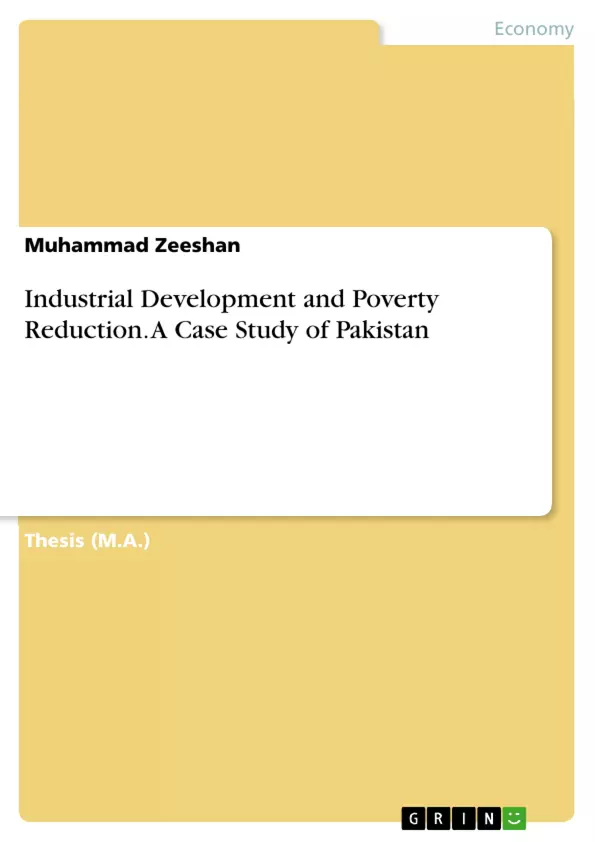
Industrial Development and Poverty Reduction. A Case Study of Pakistan
Magisterarbeit, 2013
68 Seiten, Note: 3.25/4.00
Leseprobe
Table of Contents
- Chapter 1: Introduction
- 1. Introduction
- 2. Reasons for Sick Industrial Units
- 3. Effects of Industrialization
Objectives and Key Themes
This study aims to investigate the relationship between industrial development and poverty reduction in Pakistan. It analyzes the current state of Pakistan's industrial sector, identifies factors hindering its growth, and explores the potential for industrialization to alleviate poverty.
- The impact of industrial development on poverty reduction in Pakistan.
- The role of industrial growth in employment generation and income increase.
- Analysis of factors hindering industrial growth in Pakistan (e.g., outdated technology, lack of investment).
- The contribution of small and medium enterprises (SMEs) to the Pakistani economy.
- The link between financial development and industrial growth in poverty reduction.
Chapter Summaries
Chapter 1: Introduction: This introductory chapter establishes the context of the study by highlighting the high poverty rate in Pakistan and its connection to the underdevelopment of the industrial sector. It explores the relationship between economic growth and poverty reduction, using examples from other countries to illustrate this connection. The chapter also provides a brief overview of industrial revolutions, highlighting the historical context and contrasting it with Pakistan's situation. It details Pakistan's industrial sector's contribution to the GDP, emphasizing the significant role of SMEs in employment and economic activity. Finally, the chapter outlines several factors contributing to the underperformance of the Pakistani industrial sector, including outdated technology, lack of investment, and issues with labor and political instability. The chapter concludes by emphasizing the importance of labor productivity, using comparative data from other countries, such as China and India, to underscore Pakistan's challenges in improving productivity across various sectors, including agriculture and mining.
Keywords
Industrial development, poverty reduction, Pakistan, economic growth, employment generation, small and medium enterprises (SMEs), financial development, labor productivity, outdated technology, investment, political instability.
Frequently Asked Questions: A Comprehensive Language Preview
What is the overall purpose of this document?
This document provides a comprehensive preview of a study investigating the relationship between industrial development and poverty reduction in Pakistan. It includes a table of contents, objectives and key themes, chapter summaries, and keywords.
What are the main objectives of the study?
The study aims to investigate the impact of industrial development on poverty reduction in Pakistan. It analyzes factors hindering industrial growth and explores the potential for industrialization to alleviate poverty, focusing on the role of industrial growth in employment and income increase, the contribution of SMEs, and the link between financial development and industrial growth in poverty reduction.
What are the key themes explored in the study?
Key themes include the impact of industrial development on poverty reduction, the role of industrial growth in employment and income, factors hindering industrial growth (such as outdated technology and lack of investment), the contribution of SMEs, and the relationship between financial development and industrial growth in poverty reduction. The study also emphasizes the importance of labor productivity.
What does the introduction chapter cover?
Chapter 1 establishes the study's context by highlighting Pakistan's high poverty rate and its link to industrial underdevelopment. It explores the relationship between economic growth and poverty reduction, provides an overview of industrial revolutions, details Pakistan's industrial sector's contribution to GDP, and outlines factors hindering its performance (outdated technology, lack of investment, labor issues, political instability). It also stresses the importance of labor productivity using comparative data from other countries.
What are the key factors hindering industrial growth in Pakistan, according to the preview?
The preview highlights outdated technology, lack of investment, labor issues, and political instability as key factors hindering industrial growth in Pakistan.
What is the role of SMEs emphasized in this study?
The study emphasizes the significant contribution of small and medium enterprises (SMEs) to the Pakistani economy and their role in employment and economic activity.
What is the importance of labor productivity in this study?
The study underscores the importance of labor productivity, using comparative data from other countries to highlight Pakistan's challenges in improving productivity across various sectors.
What keywords are associated with this study?
Keywords include industrial development, poverty reduction, Pakistan, economic growth, employment generation, SMEs, financial development, labor productivity, outdated technology, investment, and political instability.
Details
- Titel
- Industrial Development and Poverty Reduction. A Case Study of Pakistan
- Hochschule
- University of the Punjab (UNIVERSITY OF THE PUNJAB LAHORE PAKISTAN - DEPARTMENT OF ECONOMICS)
- Veranstaltung
- DEVELOPMENT ECONOMICS
- Note
- 3.25/4.00
- Autor
- Muhammad Zeeshan (Autor:in)
- Erscheinungsjahr
- 2013
- Seiten
- 68
- Katalognummer
- V476731
- ISBN (eBook)
- 9783668958128
- ISBN (Buch)
- 9783668958135
- Sprache
- Englisch
- Schlagworte
- industrial development poverty reduction case study pakistan
- Produktsicherheit
- GRIN Publishing GmbH
- Preis (Ebook)
- US$ 32,99
- Preis (Book)
- US$ 46,99
- Arbeit zitieren
- Muhammad Zeeshan (Autor:in), 2013, Industrial Development and Poverty Reduction. A Case Study of Pakistan, München, Page::Imprint:: GRINVerlagOHG, https://www.diplomarbeiten24.de/document/476731
- Autor werden
- Ihre Optionen
- Vertriebskanäle
- Premium Services
- Autorenprofil
- Textarten und Formate
- Services für Verlage, Hochschulen, Unternehmen

- © GRIN Publishing GmbH.
- Alle Inhalte urheberrechtlich geschützt. Kopieren und verbreiten untersagt.
- info@grin.com
- AGB
- Open Publishing
Der GRIN Verlag hat sich seit 1998 auf die Veröffentlichung akademischer eBooks und Bücher spezialisiert. Der GRIN Verlag steht damit als erstes Unternehmen für User Generated Quality Content. Die Verlagsseiten GRIN.com, Hausarbeiten.de und Diplomarbeiten24 bieten für Hochschullehrer, Absolventen und Studenten die ideale Plattform, wissenschaftliche Texte wie Hausarbeiten, Referate, Bachelorarbeiten, Masterarbeiten, Diplomarbeiten, Dissertationen und wissenschaftliche Aufsätze einem breiten Publikum zu präsentieren.
Kostenfreie Veröffentlichung: Hausarbeit, Bachelorarbeit, Diplomarbeit, Dissertation, Masterarbeit, Interpretation oder Referat jetzt veröffentlichen!
- GRIN Verlag GmbH
-
- Nymphenburger Str. 86
- 80636
- Munich, Deutschland
- +49 89-550559-0
- +49 89-550559-10
- info@grin.com
-









